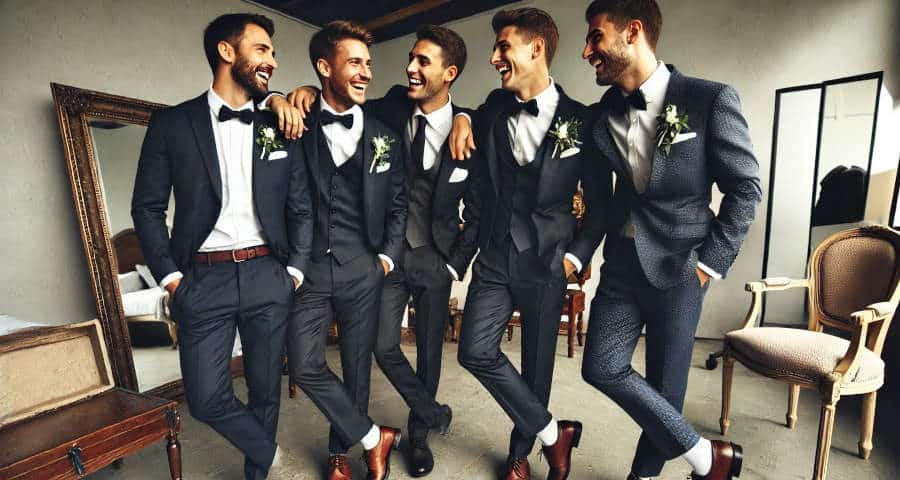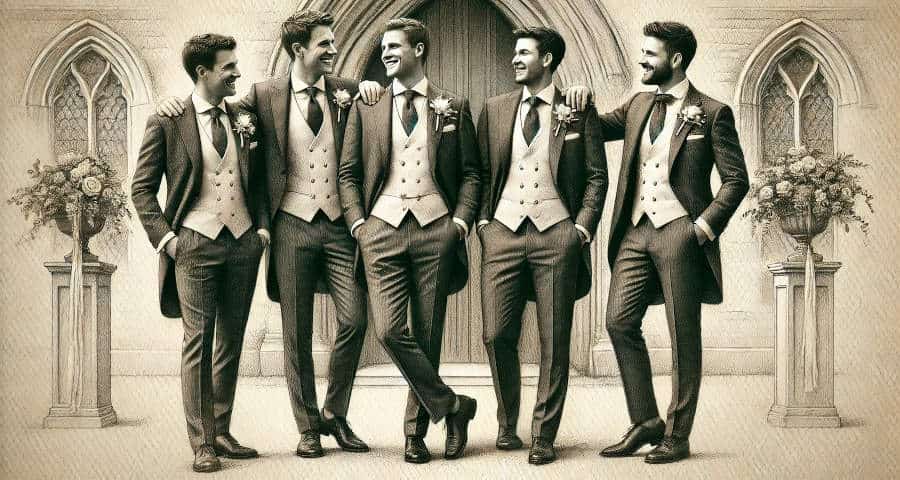As a groom, one of the most personal decisions you’ll make for your wedding is choosing your groomsmen.
These are the men who have played significant roles in your life, your brothers, best friends, or close relatives
These are the guys who will support you throughout the wedding process, from the planning stages to the big day itself.
Their responsibilities may include helping with logistics, organising the bachelor party, and ensuring everything runs smoothly on the wedding day.
More importantly, they’ll be there to share in your joy and stand with you as you take this major life step.
How Many Groomsmen

Before you decide who your groomsmen will be, you first need to determine how many groomsmen you’ll have. This decision often depends on the size and formality of the event, as well as the number of bridesmaids involved.
As a general rule, larger weddings can accommodate more groomsmen, while smaller, more intimate gatherings might benefit from a smaller number:
- Small Weddings (Under 50 Guests): One to three groomsmen are usually sufficient, keeping the ceremony personal and focused on close relationships. In very small weddings, the best man might be the only groomsman.
- Medium-Sized Weddings (50-150 Guests): A wedding party of three to six groomsmen works well, providing a balanced appearance during the ceremony and enough support for necessary tasks. The best man typically leads this group, coordinating efforts and taking on key responsibilities.
- Large Weddings (150+ Guests): Six to ten groomsmen can help manage the complexities and logistics of a large guest list. Alternatively, if you prefer a smaller group of groomsmen, consider appointing additional ushers to assist with tasks such as ushering guests and coordinating transportation. The best man leads the groomsmen, ensuring everything runs smoothly and that everyone knows their roles.
Matching the number of groomsmen to the number of bridesmaids is common to ensure symmetry during the ceremony and in photos. However, this is not a strict rule, and some couples choose to have uneven wedding parties based on their closest friends and family members.
When determining the number of groomsmen, consider including brothers or close male relatives. Their inclusion not only honours family relationships but also enhances the personal significance of your wedding day.
Ultimately, consider your personal preferences and social circle. The number of groomsmen should reflect your significant relationships, not just aesthetics or tradition. Think about which friends and family members have supported you and who you want to play a significant role on your wedding day.
The Role of Groomsmen

Understanding the roles and duties expected of groomsmen before and during the wedding, as well as their financial commitments, can help you select those who are not only supportive but also prepared to fulfil their roles to the best of their ability.
Pre-Wedding Responsibilities:
Before the wedding day arrives, groomsmen are often called upon to assist with various pre-wedding tasks:
- Support and Advice: Groomsmen help support the groom with various tasks, such as accompanying him to view potential wedding venues and meet with vendors like photographers, florists, and caterers, providing their input to help make informed decisions.
- Bachelor Party Planning: One of the most well-known responsibilities of groomsmen is organising the bachelor party. From selecting the venue to planning activities, groomsmen ensure the groom has a memorable send-off into married life.
- Attire Selection: Groomsmen typically coordinate with the groom to select and acquire their wedding attire, ensuring a cohesive and polished look for the wedding party.
- DIY Projects and Decor: Whether it’s assembling centrepieces, crafting decorations, or setting up wedding signage, groomsmen can pitch in with DIY projects to add a personal touch to the wedding decor.
- Transportation and Logistics: Groomsmen may help coordinate transportation logistics for the wedding day, ensuring that everyone arrives at the ceremony and reception venues on time. This can involve organising carpooling arrangements or arranging transportation services.
- Tech Support: In the digital age, groomsmen may lend their technical expertise by assisting with setting up audiovisual equipment for slideshows, playlists, or photo booths at the wedding reception.
Day-Of Responsibilities:
On the day of the wedding, groomsmen are instrumental in ensuring that everything runs smoothly:
- Assisting the Groom: Groomsmen provide practical assistance to the groom, from helping him get dressed to ensuring he arrives at the ceremony venue on time.
- Ushering Guests: Groomsmen may be tasked with ushering guests to their seats before the ceremony begins, helping to create a welcoming and organised atmosphere.
- Supporting the Groom: Throughout the day, groomsmen offer support to the groom, calming any nerves and ensuring he feels relaxed and ready to say “I do.”
Best Man’s Responsibilities:
The best man’s responsibilities often extend beyond those of the other groomsmen. In addition to the general duties, the best man usually:
- Takes the lead in organising the bachelor party.
- Holds the wedding rings during the ceremony.
- Delivers a speech or toast at the reception.
- Acts as a point of contact for vendors and helps manage the wedding day schedule.
Financial Responsibilities:
Clear communication about financial expectations is crucial. While the financial responsibilities of groomsmen can vary depending on cultural norms and individual circumstances, there are some common expectations:
- Attire and Accessories: Groomsmen are typically expected to cover the cost of their wedding attire and any accessories required for the ceremony.
- Bachelor Party Expenses: Groomsmen often contribute to covering the expenses associated with the bachelor party, including activities, transportation, and accommodations.
- Travel and Accommodation: If the wedding is held in a different location, groomsmen are usually responsible for their travel and accommodation expenses.
Clear Communication:
It’s important for the groom to communicate clearly with his groomsmen about their roles and financial responsibilities. Setting expectations early on helps ensure everyone is on the same page and can fulfil their duties effectively.
Who to Consider When Choosing Your Groomsmen

Selecting your groomsmen should be a thoughtful process that reflects your current relationships and the role you expect each person to play on your special day. It’s important that your groomsmen support you and participate meaningfully, rather than just filling a quota.
Brothers and Close Relatives: Incorporating brothers or close male relatives as groomsmen can add a special familial touch to your wedding. Even if you’re not incredibly close, including them can honour your family ties. Young siblings or relatives might serve as junior groomsmen or ushers if you’re concerned about their maturity levels.
Friends: Think about the roles that friends have played in your life. Family often feels like a default choice due to their significant emotional investment. However, friends who have shared important life stages with you can also be excellent choices. Childhood and college friends have likely been through many life changes with you and can bring a sense of nostalgia and continuity to your wedding. They can share stories and add a personal history element to your speeches and toasts, ensuring they are still significant in your life and not just included for nostalgia’s sake.
Work Friends: Work friends often see a side of you that others don’t. If you spend a significant part of your day with these individuals, their presence can add another layer of personalization to your wedding. Be mindful of maintaining professional boundaries to ensure that including work friends does not create awkward dynamics at your workplace. Only include work friends if they are genuinely close to you, not just because you see them every day.
Guidelines on Reciprocity:
The expectation to include someone as a groomsman because they included you in their wedding can complicate decisions. You shouldn’t feel obligated to choose someone just because you were a groomsman at their wedding. Relationships evolve, and your wedding party should reflect your current support system. If someone expects to be in your wedding party due to past history, be honest about your choices and explain your reasoning clearly.
Dealing with Potential Challenges:
Choosing groomsmen can sometimes be challenging, especially if you have more friends than spots. Here are some strategies to handle this situation:
- Assign Special Roles: Consider giving close friends who aren’t groomsmen other important roles, such as ushers, readers, or master of ceremonies. This way, they still feel included in your special day.
- Have a Conversation: If you have to leave someone out, have an honest and heartfelt conversation with them. Explain your decision and emphasise how much their friendship means to you.
- Group Involvement: Involve larger groups of friends in pre-wedding activities, like helping with bachelor party planning or DIY wedding projects. This inclusion can help them feel valued and part of the celebration.
- Consider Your Venue: Sometimes the size of your venue can dictate the number of groomsmen. If space is limited, explain this logistical constraint to your friends to help them understand your decision.
Personalities and Dynamics:
Consider the personalities and dynamics within the group of chosen groomsmen to ensure they work well together. Selecting groomsmen who have positive relationships with each other can help create a supportive and enjoyable environment. Avoid pairing individuals who have unresolved conflicts or drastically different temperaments that might lead to tension. A harmonious group will not only make the wedding planning process smoother but also contribute to a more enjoyable wedding day for everyone involved.
Ultimately, it’s important to choose groomsmen who are significant in your life and can fulfill their roles effectively. Balancing relationships and practical considerations will help ensure that your wedding party feels right for you and your special day.
Who to Actually Be Your Groomsmen

When deciding who should stand by your side as groomsmen, consider the following key points:
Reliability and Responsibility: Choose individuals who are known for being dependable and responsible. They should be able to manage their duties effectively and support you throughout the wedding planning process and the wedding day itself.
Family Connections: Select family members such as brothers and close male relatives to be your groomsmen when you wish to honour familial ties. Their presence can symbolise the unity and heritage of your family. Even if you’re not incredibly close, including them can enhance the personal significance of your wedding. Consider their impact on family dynamics and how their involvement can contribute positively to the event.
Friends from Different Life Stages: Reflect on the friendships that have shaped different periods of your life, such as childhood, college, and your professional career. These friends can bring diverse perspectives and memories to your wedding. Choose those who have remained significant over time, providing continuous support and enriching your life’s journey. Their presence can add a rich layer of personal history and continuity to the celebrations.
Contribution to Wedding Dynamics: Consider how each potential groomsman will interact with the rest of the wedding party and the guests. They should be able to contribute positively to the overall atmosphere and help manage any interactions smoothly.
Willingness to Participate: Ensure that your chosen groomsmen are willing and excited to play a part in your wedding. They should be enthusiastic about the responsibilities and happy to contribute to making your day special.
Financial and Logistical Considerations: Be mindful of the personal circumstances of your potential groomsmen. Choose individuals who can realistically manage the financial and logistical demands of being a groomsman. For example, if your wedding requires travel, groomsmen may need to cover their own travel and accommodation expenses, in addition to attire costs like renting or purchasing suits and accessories. Clearly communicating these expectations early can help ensure that those you choose are both willing and able to commit fully.
Balanced Reciprocity: While it’s important to consider past roles you may have played in each other’s weddings, choose groomsmen based on current relationships rather than feeling obligated to reciprocate. Ensure that your choices reflect your present-day connections and the support system you currently value.
Non-Traditional Groomsmen Options

Groomswoman: If you have a sister, a close female friend, or another significant woman in your life, consider including her as a ‘groomsmaid’ or ‘groomswoman.’ This choice can make your wedding more personalised and inclusive, reflecting the true spectrum of your important relationships.
- Integration in Activities: When including a groomswoman, think about how she can be integrated into traditionally male activities like the bachelor party. Consider planning inclusive events that everyone can enjoy, such as a co-ed celebration or a more neutral outing.
- Attire Considerations: For attire, ensure the groomswoman feels comfortable and stylish. She might wear a dress that complements the groomsmen’s suits or opt for a coordinating suit or jumpsuit. The key is to ensure she feels part of the group while still being true to her style.
Mixed-Gender Wedding Parties: Some couples choose to have mixed-gender wedding parties on both sides. This approach can reflect modern relationships and friendships more accurately.
- Balanced Representation: Having a mixed-gender wedding party allows you to include the people who matter most to you, regardless of gender. This can create a balanced and inclusive atmosphere.
- Coordinated Attire: Coordinate the attire to ensure a cohesive look. This might mean choosing colors and styles that work well together across genders, creating a unified and polished appearance.
No Groomsmen: Alternatively, you may choose to forgo groomsmen and bridesmaids altogether, opting for a simpler and more intimate ceremony. This decision can significantly reduce the complexity of planning and shift the focus more directly onto the couple themselves.
- Reduced Complexity: Eliminating traditional wedding party roles can alleviate potential stress related to logistics and interpersonal dynamics, ensuring that your special day emphasises personal connections and shared moments.
How Far in Advance Should You Choose Groomsmen?

Selecting your groomsmen is a decision that should not be rushed or left to the last minute. Ideally, you should choose your groomsmen as soon as you have finalised the date and venue for your wedding. A good guideline is to make your selections about 6-8 months before the wedding. This allows you and your chosen groomsmen enough time to prepare and plan for the various responsibilities and events leading up to the wedding day.
Seasonal Factors: Consider the wedding season when planning your timeline. During peak wedding seasons, such as spring and summer, availability of venues, attire rentals, and other resources may be limited. Therefore, selecting your groomsmen well in advance is even more crucial. Conversely, during off-peak seasons, you might have a bit more flexibility, but early selection is still recommended to ensure everyone can make necessary arrangements.
Choosing groomsmen several months in advance also gives you the opportunity to consider factors such as availability, travel arrangements, and any other logistical considerations that may arise. Additionally, it allows your groomsmen sufficient time to budget and save for any associated costs, such as attire rentals or travel expenses.
Task Timeline: Having an extended timeline enables you to ask your groomsmen in a thoughtful and meaningful way, rather than resorting to last-minute invitations. This gesture not only shows your appreciation for their friendship but also allows them time to accept the honor and commit to fulfilling their roles with enthusiasm. Here’s a rough timeline for some key groomsmen tasks:
- 4-6 Months Before: Start planning attire fittings and ensure all groomsmen have their measurements taken.
- 2-3 Months Before: Begin organizing the bachelor party and coordinating any pre-wedding events.
- 1-2 Months Before: Finalize logistics, including transportation and accommodation arrangements, if necessary.
In instances where a shorter engagement period is unavoidable, aim for a minimum of 3-4 months for choosing groomsmen if the ideal 6-8 month timeline isn’t feasible. This ensures that both you and your groomsmen have adequate time to prepare and participate in the wedding festivities without feeling rushed or stressed.
Ultimately, the key is to prioritize open communication and thoughtful planning to ensure a smooth and stress-free process for everyone involved in your wedding party.
How To Ask Your Chosen Groomsmen

Asking your friends to be groomsmen is a significant moment and an honor, but it doesn’t need to be overly complicated. The best approach is direct and personal.
Whenever possible, try to ask in person. This allows for a more heartfelt and meaningful exchange. Meet in a comfortable setting where you can talk candidly, such as during a coffee meet-up, over a casual drink, or on a leisurely walk. Use this opportunity to express how much their support means to you and why you’ve chosen them for this important role. Mention specific instances that highlight their importance in your life.
If your prospective groomsman lives far away, consider a video chat instead of a phone call. This method still allows for a personal touch and visual connection, making the moment feel special despite the distance. Video calls can help convey your emotions and sincerity more effectively than a voice call.
Be clear about what being a groomsman entails, including any financial and time commitments. Transparency will help them make an informed decision and set clear expectations. Let them know that you aim to keep their responsibilities manageable so they can fully enjoy the celebration.
Emphasize that they don’t need to make an immediate decision. Giving them time to think it over can ease any pressure and ensure they are comfortable and committed to the role.
Follow-Up: If they need time to consider your request, set a follow-up date to discuss their decision. This can be a gentle reminder and shows that you respect their time to make an informed choice. A simple message or call a week or two after the initial ask can be a good way to check in.
Finally, make it clear that their decision won’t affect your relationship. Reassure them that you value their honest choice and that, regardless of their decision, your friendship remains a priority.

